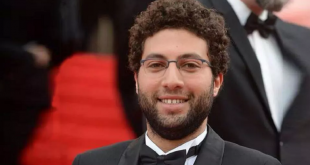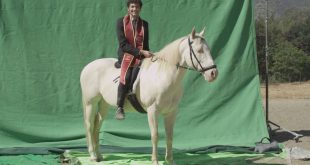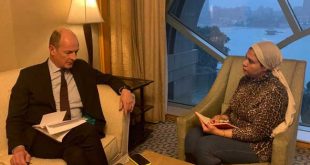Exploring the challenges female directors face in the Egyptian cinema with Nada Riyadh, whose short film The Trap is screened at Cannes this year.
Nahed Nasr – Al-Ahram Weekly
Saturday 18 May saw the world premiere of the Egyptian filmmaker Nada Riyadh’s short fiction film Fakh (The Trap) at the 58th round of the Cannes Film Festival. One of nine films at Cannes this year, The Trap is the only Egyptian in the festival this year, having been selected for the Critics Week early on. The Trap is the second production by Riyadh and producer and script consultant Ayman Al-Amir’s independent production house Felucca Films. A married couple, the two artists founded the company in 2011 and released its first production, the feature-length documentary Happily Ever After, directed by Riyadh and produced by Al-Amir, in 2016. It premiered at the International Documentary Film Festival Amsterdam and screened at over 20 festivals. The Trap is coproduced by the Berlin-based company Inselfilm Produktion and funded mainly by the Robert Bosch Stiftung Film Prize which it won in 2017. Set in the ruins of the formerly burgeoning resort of Al-Agamy, outside Alexandria, the 20-minute film focuses on a day in an abusive relationship. Tension, ugliness and brutality destroy any possibility of love.
According to Riyadh, who is keen on exploring gender issues, female directors are often expected to emphasise romance in a social drama context: “A female director should be diplomatic when speaking her mind but I’m not very good at that. My film is about an abusive relationship and in such a relationship the world doesn’t look the way we usually see it. The abused party cannot see the beauty, they can only feel the oppression and the pressure.” Even the abuse is hardly stereotypical. There is no sign of physical or verbal violence, but blackmail keeps a loveless relationship alive and Riyadh’s achievement is how palpable she makes the abuse. “This is how abuse works,” she says. “It’s there but it’s invisible. We don’t believe it’s there until we see it. That’s why we ignore complaints when we don’t see blood or a black eye.” Such an approach however was not easy to sell.
Al-Amir has shocking memories of obstacles during the production process; with the sexual scenes especially presenting a huge challenge. “Shooting on the streets of Al-Agamy was a challenge, but that was more or less expected. What was surprising was the difficulty of forming and maintaining a cast and crew!” It took some 200 auditions to select an actress for the main role. “Some were very good but had issues with the sex scenes. Others including well-known actresses said yes then changed their mind after a few days of rehearsals. But the most astonishing experience was when an actress was selected and agreed to take part, then halfway through shooting the film, decided she would not continue unless we removed all the sex, especially in the closing scene.” The overriding conservatism is such that some members of the crew took that actress’s side. “It was very strange. They insisted on their conditions. We decided to stop shooting, and so they destroyed the sets. It was a very difficult time for us, but we cannot compromise our values and vision.” Being a woman director, Riyadh adds, just added insult to injury: “The mostly male crew expects you to abide by the conservative mores that dominate society. No actress can be comfortable with technicians looking down on her and her role.”

The cost of the incident was that they started again from scratch, having to find a new actress and new crewmembers. “It took us two months and all our personal savings to start over, because we’d already spent a big part of the budget. And with a new actress we had to shoot everything from all over again.” But both Riyadh and Al-Amir could not be more proud of their film being one of seven out of 1065 submitted to the Critics Week to be chosen. Al-Amir says the reason is how much potential and promise it shows cinematically, while Riyadh stresses Al-Amir’s crucial role. The film took three years to make, Riyadh having written the first version of the script in 2016. But she does not regret taking her time: “When the treatment of the film won the Robert Bosch Stiftung Film Prize, everyone was telling us to go ahead and shoot. Your film is ready, they said. But Ayman thought the script needed more time to develop and become stronger. A producer with a deep understanding of the script potentials is very important and it is something most Egyptian productions are unaware of. Independent filmmakers complain of the atmosphere and the circumstances but they don’t spend enough time on the writing. “There is a culture of feeling ready when you’re not – that’s very harmful.” To prioritise the script is also a core concept for Felucca Films, which is now working on four projects by other directors as well as another feature-length documentary by Riyadh and a script development programme for long fiction films called Mahd.
Both Riyadh and Al-Amir came to filmmaking through the Jesuit Film School of Alexandria, Al-Amir being a medical graduate who joined in 2005 and Riyadh an engineering graduate who joined in 2007. They met in 2010, and Happily Ever After was their first collaboration. “In this film we were exploring our cinematic language and also our own relationship,” Riyadh says. But the couple had grander ideas for Felucca than simply producing this film. Establishing a production company in his country was El-Amir’s graduation project the Red Sea Institute of Cinematic Arts in Aqaba, a joint effort of Jordan’s Royal Film Commission and the University of Southern California’s School of Cinematic Arts. “Felucca Films was the translation of my studies and my experience as a script consultant,” he says. “The main aim of Felucca is to establish a different understanding of the role of the producer and the workflow of filmmaking in Egypt. Producers should share in the vision and not only facilitate the production, because that means understanding the script’s potential and bringing out the best possible result.”
Riyadh is pleased with her achievement but she has broader hopes: “Female filmmakers in our society need support. There should be a kind of network of directors and producers who are aware of the challenges females face in the industry, especially those who want to work on films that tackle gender issues in a different and more honest way.”






